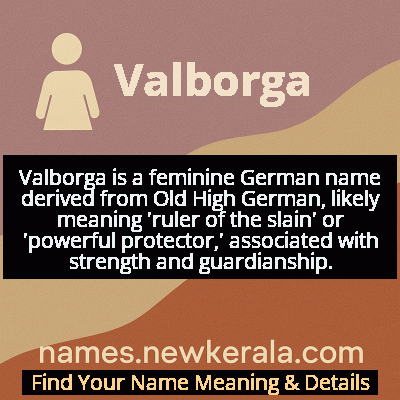Valborga Name Meaning & Details
Origin, Popularity, Numerology Analysis & Name Meaning of Valborga
Discover the origin, meaning, and cultural significance of the name VALBORGA. Delve into its historical roots and explore the lasting impact it has had on communities and traditions.
Name
Valborga
Gender
Female
Origin
German
Lucky Number
6
Meaning of the Name - Valborga
Valborga is a feminine German name derived from Old High German, likely meaning 'ruler of the slain' or 'powerful protector,' associated with strength and guardianship.
Valborga - Complete Numerology Analysis
Your Numerology Number
Based on Pythagorean Numerology System
Ruling Planet
Venus
Positive Nature
Harmonious, responsible, caring, and artistic.
Negative Traits
Overly idealistic, superficial, possessive, or jealous.
Lucky Colours
Pink, turquoise.
Lucky Days
Friday.
Lucky Stones
Diamond, turquoise.
Harmony Numbers
2, 3, 9.
Best Suited Professions
Artists, musicians, teachers, healthcare workers.
What People Like About You
Warmth, nurturing nature, artistic flair.
Famous People Named Valborga
Saint Walpurga
Missionary and Abbess
English missionary who helped convert Germanic tribes to Christianity, founded double monastery at Heidenheim
Walburga Habsburg
Noblewoman and Abbess
Member of the Habsburg dynasty who became Abbess of the Convent of St. Clare in Vienna
Walburga, Lady Paget
Diplomat and Writer
Hungarian-born British diplomatic wife and author who influenced European politics through her salon
Name Variations & International Equivalents
Click on blue names to explore their detailed meanings. Gray names with will be available soon.
Cultural & Historical Significance
Extended Personality Analysis
The name Valborga carries strong personality associations derived from its 'protecting ruler' meaning and historical bearers. Individuals with this name are typically perceived as possessing natural authority combined with deep protective instincts. They often exhibit the classic traits of a matriarchal figure - strong-willed yet compassionate, traditional yet adaptable, and fiercely loyal to their community. The 'ruler' component suggests organizational ability, strategic thinking, and leadership qualities, while 'protecting' indicates nurturing tendencies, empathy, and defensive strength. Valborgas are often seen as pillars of their communities, the people others turn to in crises because they combine clear-headed decision-making with genuine concern for others' welfare. They tend to be deeply connected to their heritage and family traditions while being progressive enough to adapt those traditions to modern contexts. Their strength is typically quiet rather than ostentatious - the steady, reliable presence that holds things together during turbulent times. This combination of traits makes them excellent in roles requiring both authority and compassion, from community leadership to healthcare and education.
Modern Usage & Popularity
In contemporary naming practices, Valborga maintains a distinctive presence as a traditional choice with deep cultural resonance. While not commonly found on birth certificate lists, it enjoys steady usage particularly in Germany, Austria, and Scandinavian countries where vintage names are experiencing renewed interest. The name sees highest frequency in Bavaria and other Catholic regions of southern Germany where saint's names remain popular. Modern parents choosing Valborga typically value historical continuity, cultural heritage, and the name's strong yet feminine qualities. It appeals to those seeking alternatives to more common Germanic names like Matilda or Brunhilda while maintaining similar historical weight. The Swedish variation Valborg sees slightly more frequent use, particularly among families celebrating the traditional Valborg spring festival. Digital era trends show the name appearing in historical fiction and fantasy literature, introducing it to new audiences. While its usage remains modest, Valborga represents a meaningful choice for parents seeking a name with substantial historical roots, cultural significance, and a powerful, protective meaning that transcends generations.
Symbolic & Spiritual Meanings
Symbolically, Valborga represents the powerful archetype of the protective sovereign - a figure who rules through wisdom and safeguards through strength. The name embodies the metaphorical concept of the 'living fortress,' suggesting not just physical protection but emotional and spiritual sanctuary. Its dual components - 'val' (rule) and 'borg' (protection) - create a rich symbolic tapestry representing the balance between authority and care, structure and safety. In seasonal symbolism, Valborga connects to spring's renewal and the triumph of light, as reflected in Walpurgis Night celebrations where bonfires symbolically ward off darkness and welcome the growing season. The name also carries esoteric significance as a bridge between worlds - historically between pagan and Christian traditions, and metaphorically between different aspects of feminine power. It symbolizes the guardian who preserves cultural memory while enabling progress, the matriarch who maintains tradition while nurturing growth. In modern symbolic terms, Valborga represents integrated strength - the combination of leadership capability with protective instinct that creates truly effective and compassionate authority figures in any context.

